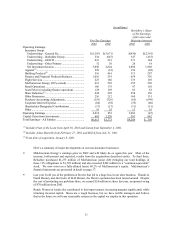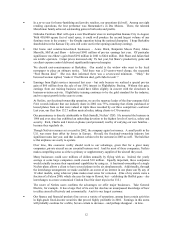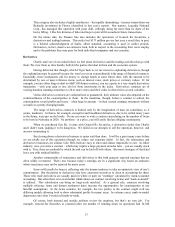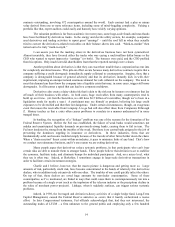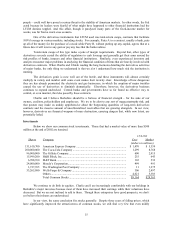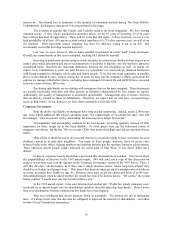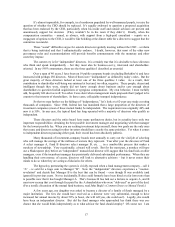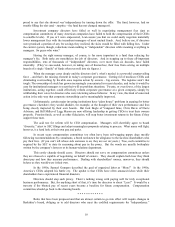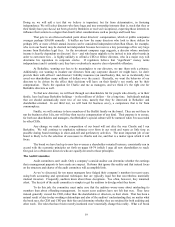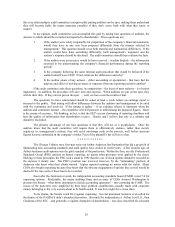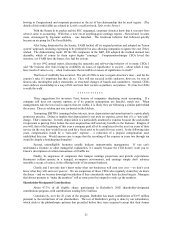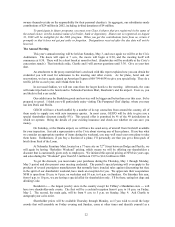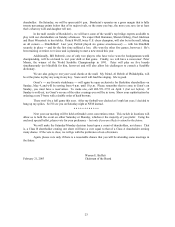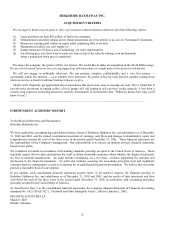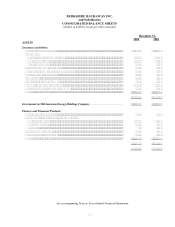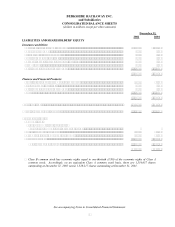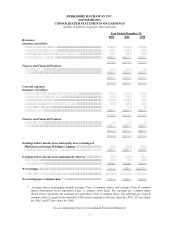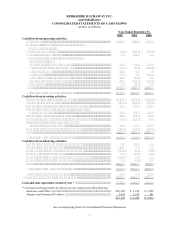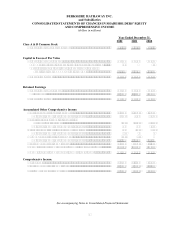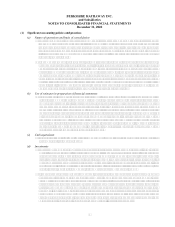Berkshire Hathaway 2002 Annual Report Download - page 22
Download and view the complete annual report
Please find page 22 of the 2002 Berkshire Hathaway annual report below. You can navigate through the pages in the report by either clicking on the pages listed below, or by using the keyword search tool below to find specific information within the annual report.21
bowing to Congressional and corporate pressures as the act of his chairmanship that he most regrets. (The
details of this sordid affair are related in Levitt’ s excellent book, Take on the Street.)
With the Senate in its pocket and the SEC outgunned, corporate America knew that it was now boss
when it came to accounting. With that, a new era of anything-goes earnings reports – blessed and, in some
cases, encouraged by big-name auditors – was launched. The licentious behavior that followed quickly
became an air pump for The Great Bubble.
After being threatened by the Senate, FASB backed off its original position and adopted an “honor
system” approach, declaring expensing to be preferable but also allowing companies to ignore the cost if they
wished. The disheartening result: Of the 500 companies in the S&P, 498 adopted the method deemed less
desirable, which of course let them report higher “earnings.” Compensation-hungry CEOs loved this
outcome: Let FASB have the honor; they had the system.
In our 1992 annual report, discussing the unseemly and self-serving behavior of so many CEOs, I
said “the business elite risks losing its credibility on issues of significance to society – about which it may
have much of value to say – when it advocates the incredible on issues of significance to itself.”
That loss of credibility has occurred. The job of CEOs is now to regain America’ s trust – and for the
country’ s sake it’ s important that they do so. They will not succeed in this endeavor, however, by way of
fatuous ads, meaningless policy statements, or structural changes of boards and committees. Instead, CEOs
must embrace stewardship as a way of life and treat their owners as partners, not patsies. It’ s time for CEOs
to walk the walk.
* * * * * * * * * * * *
Three suggestions for investors: First, beware of companies displaying weak accounting. If a
company still does not expense options, or if its pension assumptions are fanciful, watch out. When
managements take the low road in aspects that are visible, it is likely they are following a similar path behind
the scenes. There is seldom just one cockroach in the kitchen.
Trumpeting EBITDA (earnings before interest, taxes, depreciation and amortization) is a particularly
pernicious practice. Doing so implies that depreciation is not truly an expense, given that it is a “non-cash”
charge. That’ s nonsense. In truth, depreciation is a particularly unattractive expense because the cash outlay
it represents is paid up front, before the asset acquired has delivered any benefits to the business. Imagine, if
you will, that at the beginning of this year a company paid all of its employees for the next ten years of their
service (in the way they would lay out cash for a fixed asset to be useful for ten years). In the following nine
years, compensation would be a “non-cash” expense – a reduction of a prepaid compensation asset
established this year. Would anyone care to argue that the recording of the expense in years two through ten
would be simply a bookkeeping formality?
Second, unintelligible footnotes usually indicate untrustworthy management. If you can’ t
understand a footnote or other managerial explanation, it’ s usually because the CEO doesn’ t want you to.
Enron’ s descriptions of certain transactions still baffle me.
Finally, be suspicious of companies that trumpet earnings projections and growth expectations.
Businesses seldom operate in a tranquil, no-surprise environment, and earnings simply don’ t advance
smoothly (except, of course, in the offering books of investment bankers).
Charlie and I not only don’ t know today what our businesses will earn next year – we don’ t even
know what they will earn next quarter. We are suspicious of those CEOs who regularly claim they do know
the future – and we become downright incredulous if they consistently reach their declared targets. Managers
that always promise to “make the numbers” will at some point be tempted to make up the numbers.
Shareholder-Designated Contributions
About 97.3% of all eligible shares participated in Berkshire's 2002 shareholder-designated
contributions program, with contributions totaling $16.5 million.
Cumulatively, over the 22 years of the program, Berkshire has made contributions of $197 million
pursuant to the instructions of our shareholders. The rest of Berkshire's giving is done by our subsidiaries,
which stick to the philanthropic patterns that prevailed before they were acquired (except that their former


